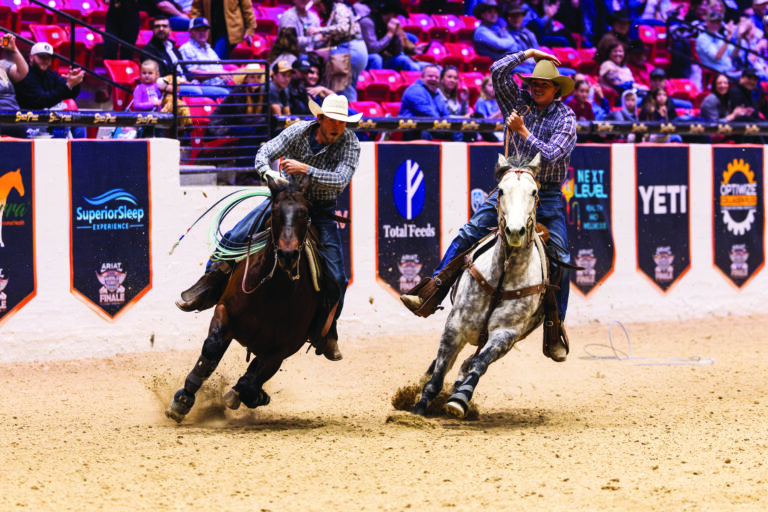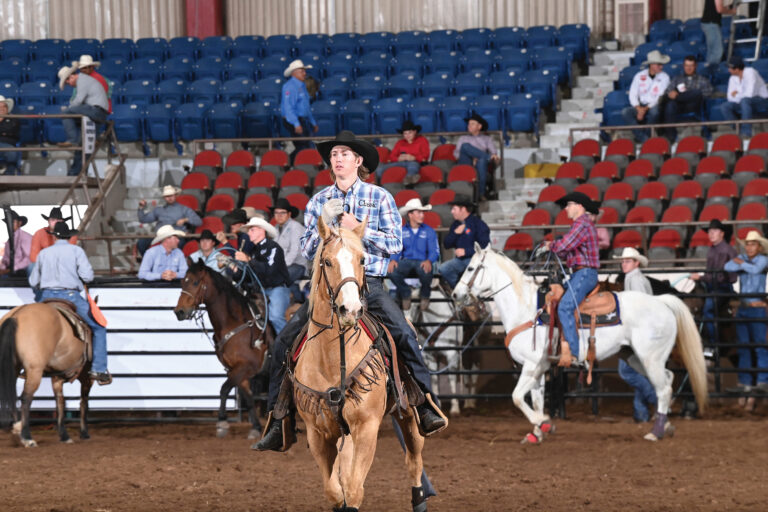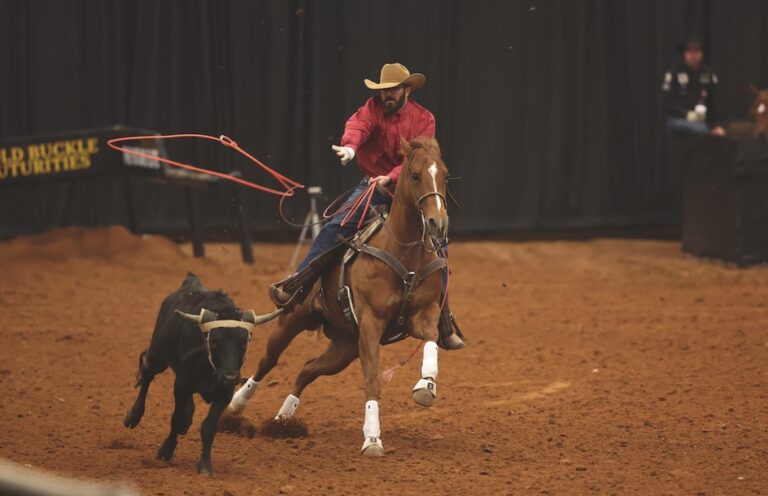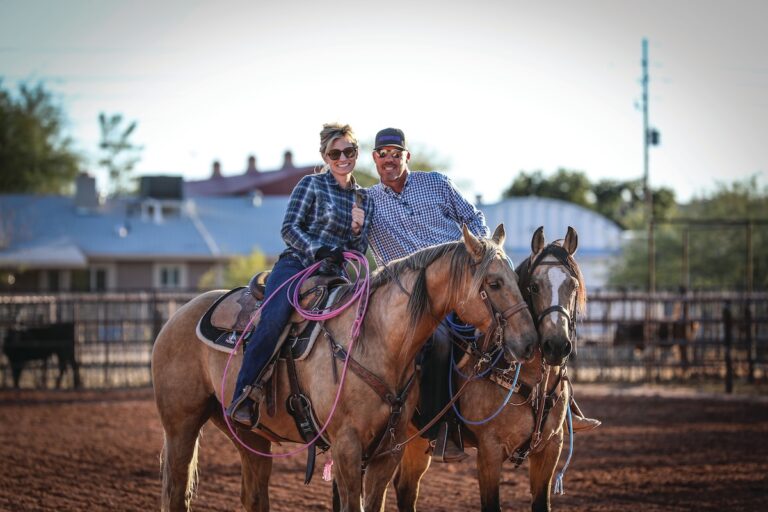Here comes the 2024 regular-season finish line. One last mad dash for the weary rodeo road warriors who’ve been out there all year working toward the golden Top 15 ticket to rope at the Thomas & Mack Center in December.
Ever seen someone who’s just run a marathon dig deep enough to sprint the last few hundred yards to try and eke out the win? That’s exactly how every guy within reach of this year’s Wrangler National Finals Rodeo cut feels right now. Time to step on the gas, and some tanks are running on fumes. As we head down the backstretch, we thought it would be fun to have a few longtime Top 15 regulars weigh in on their Finals philosophies, complete with words of wisdom for this year’s bubble boys.
Tee Woolman, Clay Cooper and Walt Woodard have 95 National Finals back numbers and 12 gold buckles between them. Woolman’s National Finals count alone is 46, including 27 in the team roping and 19 in the steer roping. Cooper’s heeled at 29 NFRs and Woodard’s been there and done that 20 times…and counting.
Tee Woolman

How big a deal is it to make the Finals when you’re out there rodeoing?
“It’s the biggest deal,” said three-time World Champion Team Roper Woolman, who’s 67 and now calls Stephenville, Texas home. “If that’s what you set out to do, that’s what you have to do. If you’re rodeoing for a living, you’ve got to make the Finals, bottom line.”
What’s the difference between a Top 20 guy and a Top 15 guy?
“Probably about two rodeos. Maybe one. That’s what it boils down to. It’s the guy who gets the break when you’re battling for a spot at those last couple rodeos when the 20th guy can move up to 15th and vice versa.”
What can the Top 20 types do to get over the hump?
“I think it’s all about your mindset all year long. And at the end, when you’re tired and dragging, you have to be more focused and on point than ever. You don’t want to put pressure on yourself, but you have to do your best and outperform the other guys.”
Did you ever get to where you took making the Finals for granted?
“I don’t think I ever took it for granted; I went at it with daily goals to win rodeos, and those stair-stepped up to the fact that my ultimate goal was always to win a world championship. I had to make the Finals to have a chance to do that. In my mind, there was never any doubt I’d make the Finals, because I was the best there was and always had the best heelers. It didn’t always go that way, but that’s how I thought about it.”
What was your closest call to not making it?
“The year a horse fell on me during Dodge City and broke my left wrist and dislocated my clavicle. I was out for six weeks in August and September, and when I started back, I was behind. When I got hurt, I was roping with Tyler Magnus. But from there, I rodeoed all over the place with everybody, including Matt Zancanella and Tim Fryar. My back was against the wall, and I barely made it, maybe 14th or 15th. But I never doubted I was going to make it.”
What’s your best advice to guys on the bubble right now?
“Buckle up. Let’s get after it. Stay positive, push forward and be gung ho about it. Remember that you’re competing against every steer, not the people. And there can be no negativity.”
Clay Cooper

How important is it to make the cut when you rope for a living?
“It’s everything, especially back in the day, because there were only a few places throughout the year where you could win a big check that was significant enough to pay something off or invest in a place,” said Cooper, who’s 63, won seven gold buckles with Jake Barnes and lives in Gardnerville, Nevada. “When I was competing, it was huge. There are a lot more opportunities to win good money, but it’s still very important because everything costs so much more and you can win $150,000 to $200,000 at the Finals now.”
What’s the secret to being a perennial NFR qualifier?
“It’s just a mindset that that’s just what you’re going to do. You need to stay prepared and equipped to win, with the right partner combination and horses. When that’s all in place, you expect to make it.
“I was down in South Texas 20 years ago in the wintertime. It was about Houston time, after Denver, San Antonio and San Angelo, and none of the regulars were in the standings. One of the new guys commented that he guessed the tide was changing because the old guys couldn’t cut it anymore. I laughed. By the start of the summer, none of those new guys were in the standings anymore, and they were filled up with the regulars.”
What sets those NFR regulars apart from the rest?
“I think once you reach that upper-level threshold, that gives you confidence. And rightly so, because you’re one of the elite guys, and you know you can do it. You have the experience and know-how, and you know not to panic on a day-to-day basis and that it’s a long grind. You learn to just go do your job, and that in the end the cream ultimately rises to the top.”
What are the most important things you can do to not get left behind?
“That’s a complex equation because you have two guys, two horses and the draw factored in. You can find yourself in the perfect storm either way—kicking butt or not doing as well as you’d like. You have to mentally flip that switch, not panic and go execute your run. Guys who try to do more than they can do tend to fail more. Being too conservative is not the answer, either. Go make your run.”
Did you ever come to expect making the Finals every year?
“I think I did, yes, because I made it so many times in a row. Then a couple times toward the end of my career, I made it right there at the tail end. I chose to rodeo my way, not as hard, and just kind of had the mindset that it’d happen if it was supposed to—and I made it. You have to override your mind when it wants to panic with the wisdom of all you know. It’s a mind-management game, and you can crater or you can rise.
“There were a few years I pulled up early, because I didn’t want to fight the fight all the way down to the end. I wasn’t roping good enough, or I didn’t have enough confidence in my horse or partner. It wasn’t as important to me as when I was younger, and I knew I’d be a lot happier if I went home and started over at the buildings the next year.”
Tell us about the years you barely made it.
“I squeaked in at the end twice. In 2013, Justin Davis and I flattened off in the middle of the summer and I’d made a deal with him that I was going home every six weeks, and taking two weeks off. That hit during Caldwell (Idaho), so he made a change. My first rodeo back was San Juan Capistrano (California), and I won it with Spinny (Aaron Tsinigine). I barely made it in 14th or 15th, and Justin made it in 15th, so we ended up roping together at the Finals that year anyway.
“In 2014, I was roping with Chad (Masters) the second time. The first year we roped together was a storybook season, but the second time was a struggle all year long. It got right down to the wire, and we were on the bubble with only Omaha and three rodeos in California left. Our backs were against the wall, but we did good in Omaha and that got me in. That was the big controversy year, when it went back and forth between Chad and Tom Richards 25 times over rodeo counts. What a fiasco. I ended up roping with Spinigine at the Finals that year, because Chad had to sit it out.”
What’s your advice to guys on the bubble right now?
“Stay hooked mentally, and keep executing runs. You can only control what you do, so back in there with the intent of repeating your run. That’s the goal, and that’s the only thing that’s going to get you there.”
Walt Woodard

You’ve had the NFR-cut ball bounce both ways, haven’t you?
“Absolutely,” said California native Woodard, 68, who won world titles 26 years apart in 1981 and 2007, and now lives in Stephenville, Texas. “I missed at the Cow Palace one year to make it. It’s not always a Cinderella story. And when you don’t make it, you want to go to Bangladesh, so hopefully they don’t have television and you don’t have to see it on TV, because you don’t think they can have it without you. You don’t ever want to feel that way again.”
All the talk is about the regular-season backstretch, but you have other ideas on that, don’t you?
“Yes, I do. A lot of people put so much importance on the end, but what about Reno? And Greeley? And that time you overslept, and weren’t really prepared to run that one steer? Maybe you didn’t have a great winter, or had a subpar spring. Be honest. Did you really try hard enough all year long? When you don’t make it, it comes down to the failures throughout the year. What you should be thinking is, ‘How did I put myself in this position? I should not be here.’ Making it is about giving it all you have all the time. No one comes through every time, but you have to try.”
What’s different about the guys who make it year after year, and how do you handle the disappointment of not getting it done?
“Great champions have great focus. They eliminate all the doubts, distractions and fears. I’ve always been interested in watching people under pressure, like relief pitchers. I’ve asked Madison Bumgarner how he handles having his entire team counting on him, then a guy hits it over the fence and they lose the game. The way he looked at it was the best hitters in the world are going to hit it over the fence sometimes, no matter who’s on the mound.
“I listened to an older baseball player talk about the same thing one time, and he had a cabin in a beautiful place he went to in the off-season. How he handled it was saying to himself, ‘If they hit it over the fence, the worst thing that happens is they cancel my contract and I get to go to the cabin.’ Those are the thoughts you need to cling to, so you don’t bury yourself in self-doubt. Stop. That will kill you.”
What do you say to the guys who don’t make it this year?
“Jake Barnes said it best, ‘You either win something or learn something.’ (A quote Jake credits to Ty Murray.) That’s one of the greatest lines of all time. Worst-case scenario, you’re going to hate watching it on TV. You can let that motivate you or destroy you. Your choice. If you know you have the ability, make some adjustments and work harder.
“When I won second (in the world) in 2006 (behind his header Matt Sherwood), that drove me. I thought, ‘If I can beat all but one guy who ropes in the PRCA, surely I can beat one more guy.’ And I did. I came back in 2007 (heeling for Clay Tryan), made some adjustments—including riding stronger position going down the arena and adding more swing speed on my rope—and won the championship in 2007. I took little pieces from guys who are great, added them to my own style and got it done.”
Final words of wisdom for this year’s bubble boys, please.
“Leo (Camarillo) said one time, ‘You have to challenge every steer, and win what you can win on him. You can’t rope against someone else, what’s the matter with you?’ That was so helpful to me. I benefitted from Leo so much, because what he said was true, even when it was hard to hear.
“This game is about being mentally strong. When you back in that box, you are alone. All by yourself. It’s up to you to either be strong and come through or fail. This is either important enough to you to figure out what you need to do to make it, or not. Just remember that if you do fail, no one cares. That should surely take some of the pressure off of you.”
—TRJ—









